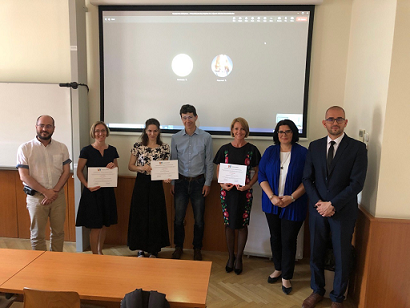How can the Hungarian artisanal fashion industry be sustainable?

“97 percent of the industry profits is concentrated in twenty fast fashion companies – manufacturing fashion rapidly becoming outdated. Small series collections are fundamentally less cost-effective, but much more sustainable” – said Klára Edőcsény, a Corvinus alumnus, and Gábor Harangozó, Associate Professor at the Department of Sustainability Management and Environmental Economics at Corvinus University of Budapest, to introduce their research. Their paper “Sustainable Business Practices in the Fashion Industry – Using the Example of Hungarian Micro, Small and Medium Enterprises” was awarded the Best Paper of ‘Vezetéstudomány’ on 15 June, when the prestigious Hungarian management science journal announced the three most outstanding papers published in the journal in 2021 at the Corvinus University Research Week. Very careful consideration precedes the selection process, with papers being ranked according to a list of citations, and awards then given out.

Fashion industry responsible for a fifth of industrial water pollution
By presenting the context of their award-winning study, Klára Edőcsény and Gábor Harangozó said that the fashion industry around the world is facing growing environmental, economic and social sustainability problems. There is a huge environmental impact from all the waste: consumers in the developed world are buying 60 per cent more clothes and keeping them for half as long as they did 15 years ago. Cotton production requires huge amounts of water, the fashion industry is responsible for 17-20% of industrial water pollution from dyeing fabrics, and washing clothes (due to polyester) releases huge amounts of microplastics into the water, which are then washed into the oceans, as microplastics are essentially unfilterable. Among the social impacts, the exploitation of those employed in the industry was mentioned: low wages, child labour are common.
In their research, the authors conducted in-depth interviews in 2019 with the managers of five small businesses that have been operating from the start with a sustainable model in mind: AIAIÉ – bespoke fashion company working only on personal orders, Lazlo Fashion – unique clothing collections made from textile waste, Réthy Fashion – garments, accessories with denim recycling, Tender Toes – pineapple leaf-based Pinatex shoes, Touch Me Not – organic cotton clothes. One of the key principles by which these businesses operate can be summed up in the phrase “Buy less and keep it for longer”. How can this principle be enforced? The authors said that it is possible to educate consumers, although consumer awareness is only just beginning to emerge in Hungary. England, Germany and the Nordic countries are ahead of us on this.
We have a choice, let’s use it!
“There is an alternative, and it’s worth considering whether you’d rather buy a sweater from a small, sustainable, ethical and high-quality manufacturer for 30,000 forints than three sweaters from a fast fashion store for the same amount. So not only are we supporting a small, sustainable business with our money, but better clothes made with care, and of course more expensive, last longer. Often, slow fashion products are timeless in design, while cheap clothes can end up with torn seams after the third wash or be out of fashion in six months.
Many people also think that small brands sell clothes at a significantly higher price than fast fashion because they are highly profitable. This is a big mistake, as they cannot bring their prices down to the level of H&M, for example, because the use of quality, often certified (e.g., GOTS – organic textiles) materials is very expensive. If they produce in Hungary in small quantities, in good quality, it costs much more than the fast fashion companies’ outsourced production to Bangladesh. Economies of scale also help keep prices down,” says Klára Edőcsény.
Hungarian consumers are very price-sensitive
Gábor Harangozó believes that today’s young people are more conscious shoppers than previous generations: “It’s becoming fashionable to buy second-hand fashion and reusable items, and I’ve noticed this in my own environment”. Klára Edőcsény mentions that even in our country, consumers are starting to become more aware of sustainability. “You can also shop in second-hand shops, go to swaps, and now you can rent not only wedding dresses, but also children’s clothes on subscription, for example. Hungarian consumers are very price-sensitive, so renting and changing clothes is also financially worthwhile. Of course, you can also pass around used clothes in good condition within the family, it’s nothing new. But now there is the Swappis Ruhaforgó: in this shop, anyone can drop off clothes that are still in good condition and receive vouchers in return, which can be used to buy clothes at a significant discount in the shop next time”, says Klára Edőcsény. She added that she herself is very much a sustainability-minded person, attending community fairs and willing to pay for more expensive but sustainable and ethically produced items of real quality. “If a dress tears, I can fix it myself, so I never throw it away. If I can’t wear it any more or give it away, then I’ll use it as a household rag” – in other words, the principles described in the study are put into practice. A conscious approach is also important because in the EU we spend more on fashion than on our health: according to the 2018 data of Eurostat, households spend 4.9% of their income on clothes – more than on health
Topics of the further excellent award-winning articles: Volunteering and authentic leadership of Generation Z
“The motivational power and value-based approach of volunteering among Generation Z youth” – this was the title of a study by Mónika Garai-Fodor, Dean of the Keleti Károly Faculty of Economics at Óbuda University. An important lesson from the research is that while socially sensitive young people are open to pro bono work, there are also those with no preference. “They are the ones we can address well, as they do not yet have a mature set of values, and a strategically well-constructed education campaign and emotional messages that strengthen their motivation are suitable for convincing them,” said the Dean. As she stressed, pro bono volunteering and CSR are a great way for an organisation to gain a competitive advantage. Universities in Madrid, Portugal, Bulgaria and France helped students to volunteer for a non-profit organisation (old people’s home, animal shelter, organisation for people with disabilities). The students mostly offered market research, marketing, website development, campaign organisation to non-profit organisations, and the authors meanwhile used 840 completed questionnaires to find out how Generation Z (young people aged 16-20) feel about volunteering. Few of the students were aware of the pro bono programme (only 10% had heard of it, which differs from volunteering in that it is more complex, project-based). At first, it was difficult to recruit students for the tasks, but by the third time, there was a huge oversubscription.
Then the author of the other excellent award, Gabriella Cserháti, Associate Professor at the University of Pannonia, presented her study on authentic leadership style. As she said, the study involved interviews with senior managers of 20 Hungarian-owned companies, lasting from one and a half to three hours. They looked at what a self-identified leader looks like; they looked for moral and ethical values in the life stories of the people they interviewed. The results show that an authentic leader is trustworthy, usually self-motivated, with strong moral and ethical values. The motivation to become a leader was also researched, and Cserháti cited a good example: “My goal was not how much money I wanted to make, I wanted to make a company where I could show how to do it well,” said one manager during an interview. Cserháti stressed that there were only two women among the participating leaders, “and I fought hard for them to agree to take part in the discussion, as several women had previously refused,” she said. The average age of the respondents was 52, the youngest 36 and the oldest 67. The survey also covered the life events that preceded becoming a leader, childhood trauma – there were 8 cases (possibly domestic alcoholism, abuse), and a few of them told that due the need to please their father, they developed performance-centricity early on.
Katalin Török